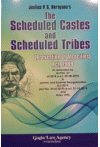
- Author(s): Justice P.S. Narayana
- Publisher: Gogia Law Agency / Publication
- Edition: 13 Ed 2023
- ISBN 13 9789391088378
- Approx. Pages 1028 + Contents
- Format Hardbound
- Approx. Product Size 24 x 18 cms
- Delivery Time 3-5 working days (within Kerala & South India) (Others 7-9 days)
- Shipping Charge Extra (see Shopping Cart)
As Amended by Act No. 27 of 2018 w.e.f. 20-08-2018 and Jammu and Kashmir Reorganisation
Act 2019 Act No. 34 of 2019 w.e.f. 31.10.2019 and Rules 1995
And Protection of Civil Rights Act, 1955 & Rules, 1977
............................................................................................................................
Description
The Scheduled Castes and Scheduled Tribes (Prevention of Atrocities) Act, 1989 is a special legislation to check and deter crimes against members belonging to Scheduled Castes and Scheduled Tribes. There has been increase in number of complaints made by these classes of people. to the police and the courts. In a recent decision rendered by the Full Bench of the Hon'ble High Court of A.P. in Yannam Satyanarayana vs. State of A.P., 2006 (1) ALD (Crl.) 605 (A.P.) = 2006 (2) ALT (Cr1.) 223 (F.B.) (A.P.) it was held that Rule 7 of the Scheduled Castes and the Scheduled Tribes (Prevention of Atrocities) Rules, 1995 is not mandatory but only a directory one, overruling the decision in Viswanadhula Chittibabu vs. State of A. P., 2002 (2) ALD (Crl.) 206 (A.P.) = 2002 (4) ALT 456 (D.B.) wherein it was held that the provisions of Rule 7 of the Rules are mandatory and infraction thereof makes the investigation wholly illegal. In the present edition we have taken care to see that the mistakes are rectified and we have also incorporated the necessary rules and the latest case law on the subject, at the appropriate places. We hope that the present edition will be more useful to the Bar, Bench and the litigant public alike and we also invite further suggestions if any for further improvement of the future editions.
.............................................................................................................................
Contents
Chapter I - Preliminary
1. Short title, extent and commencement
2. Definitions
Chapter II - Offence of Atrocities
3. Punishments for offences of atrocities
4. Punishments for neglect of duties
5. Enhanced punishment for subsequent conviction
6. Application of certain provisions of the Indian Penal Code
7. Forfeiture of Property of certain persons
8. Presumption as to offences
9. Conferment of powers
Chapter III - Externment
10. Removal of person likely to commit offence
11. Procedure on failure of person to remove himself from are and enter thereon
after removal
12. Taking measurements and photographs, etc. of persons against whom order
under section 10 is made
13. Penalty for non-compliance with order under Section 10
Chapter IV - Special Courts
14. Special Courts
14A. Appeals
15. Special Public Prosecutor and Exclusive Public Prosecutor
Chapter IVA - Rights of Victims and Witnesses
15A. Rights of victims and witnesses
Chapter V - Miscellaneous
16. Power of State Government to impose Collective Fine
17. Preventive action to be taken by the Law and Order Machinery
18. Section 438 of the Code not to apply to persons committing an offence under
the Act
19. Section 360 of the Code or the Provisions of the Probation of Offenders Act
not to apply to persons guilty of the offence under the Act
20. Act to override other Laws
21. Duty of Government to ensure effective implementation of the Act
22. Protection of action taken in good faith
23. Power to make rules
The Scheduled Cast and The Schedules Tribes (Prevention of Atrocities) Rules, 1995
Rules 1 - 18
Schedule
The Protection of Civil Rights Act, 1955
1. Short title, extent and commencement
2. Definitions
3. Punishment for enforcing religious disabilities
4. Punishment for enforcing social disabilities
5. Punishment for refusing to admit persons to hospitals, etc.
6. Punishment for refusing to sell goods render service
7. Punishment for other offences arising out of "untouchability"
7A. Unlawful compulsory labour when to be deemed to be a practice of "untouchability
8. Cancellation or suspension of licences in certain cases
9. Resumption or suspension of grants made by Government
10. Abetment of offence
10A. Power of State Government to impose collective fine
11. Enhanced by penalty on subsequent conviction
12. Presumption by courts in certain cases
13. Limitation of Jurisdiction of Civil Courts
14. Offences by companies
14A. Protection of action taken in good faith
15. Offences to be cognizable and triable summarily
15A. Duty of State Government to ensure that the rights accuring from the abolition of
"untouchability" may be availed of by the concerned persons
16. Act to override other laws
16A. Probation of Offenders Act, 1958 not to apply to persons above the age of
fourteen years
16B. Powers to make rules
17. Repeal
Schedule
Appendices
1 - 24
Index
.............................................................................................................................
Author Details
Justice Sri P.S. Narayana, Judge, High Court of Andhra Pradesh, Hails from Chittoor District, A.P. He had his law degree from Sri Venkateswara University apart from his Post Graduation in Public Administration. He is the Author of several Law books like, Law of Partnership, Law of Adverse Possession, Law of Limitation, Law of Benami, Law of Contract, S.C. & S.T. (Prevention of Atrocities), Constitution of India, Probation of Offenders Act, Law of Cantonments, commentaries on Passports Act, Law of Trusts, Endowments & Wakf, The Transfer of Property Act, etc.
The author has been delivering several lectures on different topics relating to law in Andhra Pradesh Judicial Academy and also in certain academic institutions on their invitation.
Justice P. S. Narayana was sworn in as High Court Judge on 25-06-2001.
.............................................................................................................................
